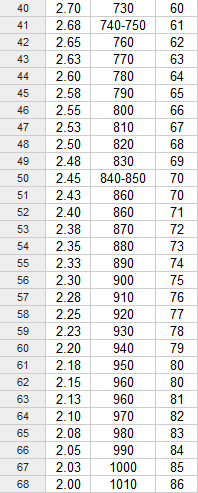SLIDING
SCALE FOR GRADES AND TEST SCORES
TO BE ELIGIBLE TO PLAY ATHLETICS AT NCAA DIVISION I AND DIVISION II


What
grades do I need to play college sports?
Are
they different in different divisions? This is one of the most common
questions in college recruiting.
There are minimum academic requirements to compete in both Division I and Division II athletics. Division I uses a sliding scale – as your GPA gets higher, your minimum required test scores get lower, and vice-versa. You should still work as hard as possible to keep your GPA high – test scores can be a wild card and you don’t want to depend on a high score on a high-pressure standardized test for your academic eligibility. No matter your skill level, good grades will make you more attractive to coaches and increase your chances of merit-based scholarships. Bad grades will do the opposite.
Remember that these are just minimum requirements – you will still need to be admitted to any college where you want to play. Make sure to check the admissions sections on the websites of specific schools you are interested in to see the typical GPA and test scores of admitted students.
Division I
Requirements
A. Graduate from high school
B. Pass these 16 core courses:
4 years English
3 years Math (Algebra I or higher)
2 years Natural/physical science (1 year of lab if offered by high school)
2 years Social Science
1 year Your choice of additional English OR Math OR Science
4 years Any of above OR foreign language OR non-doctrinal religion/philosophy
C. Satisfy the GPA
and test score requirements on the Division I sliding scale
Depending on your test scores, you will need a GPA somewhere between 2.0
and 3.55 to qualify. Regardless of your test scores and your athletic
ability, you cannot play Division I athletics with a GPA below 2.0.
For instance, with a GPA of 2.75, you would need either an SAT score of
720 or an ACT sum score of 59 to qualify. Weighted grades for honors or
advanced placement classes are accepted by the NCAA for eligibility purposes
if they are in core courses, so it is possible for a student to earn above
a 4.0.You can see the full sliding scale for GPA/test scores listed above.
For purposes of qualifying for athletics, your GPA will be calculated using only the 16 core courses listed above. Physical education and other electives not listed will not count towards your qualifying GPA.
You can use either the SAT or the ACT to fulfill your standardized testing requirement.
A note on the ACT: the qualification requirements do not use the conventional ACT “composite” score (from 1-36) but a “sum” score. The composite score averages the four ACT sections (English, Mathematics, Reading, Science), and that is how you will usually see ACT scores written. The sum score that Division I uses is the total of the four sections (they are 36 points apiece) and so is on a scale from 4 to 144.
A note on the SAT: The newest version of the SAT features 3 sections – mathematics, critical reading, and writing – with a maximum score of 2400. The NCAA does not consider the writing section of the SAT for eligibility purposes. To find your score on the sliding scale, add your mathematics and critical reading scores only.
Division II
Requirements
Unlike Division I, Division II does not use a sliding scale for academic
eligibility.
A. Graduate from high
school
B. Earn a 2.0 GPA or better in these 14 core courses:
3 years English
2 years Math (Algebra I or higher)
2 years Natural/physical science (1 year of lab if offered by high school)
2 years Social Science
2 years of your choice of additional English OR Math OR Science
3 years Any of above OR foreign language OR non-doctrinal religion/philosophy
C. Earn an SAT score of at least 820 OR an ACT sum score of at least 68.
Division III
Requirements
Division III does not have a uniform set of eligibility requirements.
Each Division III school determines their own academic requirements for
their athletes.
NAIA Requirements
A. Graduate from high school
B. Meet 2 of 3 of
these requirements:
1. 860 or better on the SAT OR an ACT composite score of 18 or better
(see explanation of ACT scores above)
2. Overall high school GPA of 2.0 or better
3. Graduate in the upper 50% of your high school graduating class